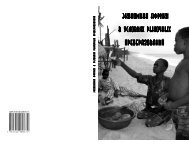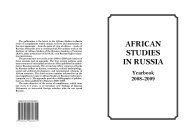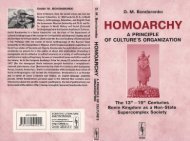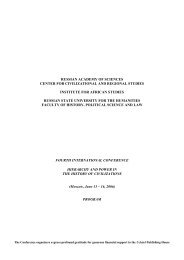L. Fituni, I. Abramova Resource Potential of Africa and Russia's ...
L. Fituni, I. Abramova Resource Potential of Africa and Russia's ...
L. Fituni, I. Abramova Resource Potential of Africa and Russia's ...
Create successful ePaper yourself
Turn your PDF publications into a flip-book with our unique Google optimized e-Paper software.
supplies only it is either a blatant lie or a mere ignorance. In reality,<br />
quite a number <strong>of</strong> large-scale development projects were realized<br />
here with the Soviet assistance in the fields <strong>of</strong> industry, education,<br />
agriculture (for instance, a well-known irrigation project in Gambella).<br />
Big industrial enterprises <strong>and</strong> generating capacities were constructed<br />
(for example, the largest at the time <strong>and</strong> still one <strong>of</strong> the most<br />
significant ones Ethiopian hydropower plant in Melka Wakena).<br />
Comprehensive geological surveys were conducted, various mineral<br />
deposits were discovered (many <strong>of</strong> them are currently being exploited<br />
or prepared for extraction).<br />
Nowadays such type <strong>of</strong> aid is usually described as “<strong>of</strong>ficial development<br />
assistance”. And it does not really matter that at that time<br />
Soviet assistance was to some extent conditioned by certain ideological<br />
or political considerations. Whatever the reasons were, one<br />
can safely say that in the 1970–1980s the USSR was the largest economic<br />
donor <strong>of</strong> Ethiopia contributing greatly to the development <strong>of</strong><br />
almost every sphere <strong>of</strong> the latter’s economy, as well as conducting a<br />
large-scale training <strong>of</strong> Ethiopian students (suffice it to say that over<br />
20 thous<strong>and</strong> Ethiopians studied in the USSR). 38<br />
With the end <strong>of</strong> the Cold War the basic principles <strong>and</strong> targets <strong>of</strong><br />
foreign policy in my country <strong>and</strong> in the whole world have considerably<br />
changed. Russia’s economic relations with Ethiopia are no<br />
longer based on political or ideological factors. Moreover, nowadays<br />
it is not public but private enterprises that are the leading economic<br />
operators in Russia. In their activities they are guided mainly by<br />
market rules <strong>and</strong> principles (pr<strong>of</strong>it generation, secure <strong>and</strong> rapid return<br />
<strong>of</strong> investments, etc.).<br />
This trend, inter alia, has had a positive effect on the relations<br />
between Russia <strong>and</strong> Ethiopia. Though 2009 was marked by the culmination<br />
<strong>of</strong> the global financial crisis, it proved to be the most economically<br />
successful in the Russian-Ethiopian relations since 1991.<br />
Thus, the overall bilateral trade totaled about $170 million, increasing<br />
1.6 times as compared with 2008 (Table 3.4.2). 39<br />
In 2009, for the first time in the post-Soviet period the Russian<br />
Federation took an active part in the regular Addis Ababa International<br />
Trade Fair. More than 20 Russian companies, organizations<br />
191







